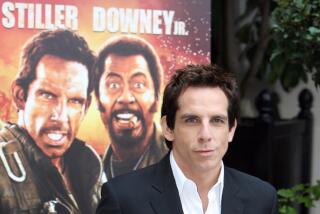How do you define children? They’re small books of words that parents have been given as Christmas presents
- Share via
I have always admired lexicographers for what I consider a largely unappreciated art--the ability to define words concisely, clearly, and--perhaps this is redundant--without ambiguity.
A lexicographer, by the way, to give the definition found in Webster’s New World Dictionary, is “a person who writes or compiles a dictionary.”
How’s that for brevity and completeness?
If you think defining words is easy, try defining some plain, everyday word like wash , meaning what housewives used to do on Monday, or table .
Let me try wash . “One’s dirty clothing, either before, during or after the process of being laundered.” (Then, of course, we have to look up laundered .)
What does Webster’s do with wash in that sense? “A quantity of clothes, etc., washed or to be washed.”
What about this quantity of clothes after it has been washed and is hung out to dry? Isn’t it still the wash? How about after it has been taken off the line and brought in and folded? Isn’t it still the wash?
Let me try table . “A piece of furniture having legs and a flat top for lamps or dishes.”
What does Webster’s say? “A piece of furniture consisting of a flat, horizontal top usually set on legs.”
I don’t think that one is too much better than mine. In fact, I think flat implies horizontal, so the horizontal is redundant. Anyway, what else is it set on if not legs? Perhaps a pedestal? Or two barrels?
As I say, it isn’t easy.
When you get into abstractions it’s even harder. How would you define joy ? How’s this? “A feeling of happiness and exhilaration.” Let’s check that against Webster’s: “A very glad feeling; happiness, great pleasure, delight.”
Think how hard it is for very small children to understand such concepts when we can hardly define them ourselves. But Joan Maturko’s kindergarten class in Jefferson School, Redondo Beach, has given it a try. They have compiled a glossary of words, as defined by one or more of them, and put it into a little 10-page booklet called “A Book of Words” as a Christmas present for their parents.
Considering the difficulty of defining such abstractions as embarrass and jealous , they have done pretty well.
The book begins with acorn , which is easy enough. They have defined it this way: “Something that squirrels and chipmunks can eat; it’s a nut.”
Well, not too bad. Webster’s says, “The fruit of an oak tree; oak nut.”
Of course that gets us into that sticky business of whether nuts are fruit or not (tomatoes, too).
They blew it entirely on the word adore , which is not only a difficult abstraction but also a homonym for “a door.”
Their definition for adore was, “Something that you go in and out; you open it for out or in.”
They also seemed to have struck out on bachelor , although somehow I have the feeling they were close. Their definition for bachelor : “You can cook with it.”
Also, they seem not to have been financially sophisticated enough to know the meaning of banquet , which they define as, “You can get money from your bank account if you need it.”
Behave is clearer in their sights: “Behave: To be good; when you do what your aunt tells you to do.”
I think the definition for cautious is rather graphic, though narrow: “Slow down; if you’re in a cave, there might be bats in them.”
Their definition for critic would certainly be approved by anyone who has ever been wounded by one. “Critic: The sound of a frog.”
Eclipse was a little harder: “Eclipse: You clip something on something; when there’s a tornado; when something breaks and it goes click.”
Elastic turned out pretty well: “Elastic: Some kind of fabric that you can pull and it goes back.”
Their understanding of family was not yet fully developed: “When you’re moving in a new house; when your whole family’s together and you go out for lunch.”
Fog is graphic, too: “Something that’s gray in the sky; when it’s in the morning and you can’t see really far.”
Their definition of germ is close enough to suggest that they are indeed the children of a scientific age. “Germ: It’s a little bug and it goes into people and it’s bad for you; it’s something that’s in your body and you don’t want anyone to catch.”
There are two views of gum : “Gum: It’s something that holds your teeth in; you chew it in your mouth.”
With jealous they had the same problem with abstractions that most of us have. They used the word itself as part of the definition. “Jealous: You like someone’s clothes; when your mother’s hugging your brother and you get jealous; when you like someone so much you’re jealous.”
That’s an interesting concept--that we can be jealous of someone we like. Perhaps because we envy them the very qualities we admire, and which we don’t have?
Their understanding of marriage is fairly rudimentary. “When you love someone and you marry them; when you’re falling in love with someone and you kiss them.”
Of course kissing someone no longer means that you have to marry them, although in certain societies it has been so.
Everybody knows what trouble means. “Trouble: When you do something that’s wrong and your mom says, ‘You’re in big trouble.’ ”
If you think those aren’t very good--go ahead--try defining chair .
More to Read
Sign up for our Book Club newsletter
Get the latest news, events and more from the Los Angeles Times Book Club, and help us get L.A. reading and talking.
You may occasionally receive promotional content from the Los Angeles Times.






